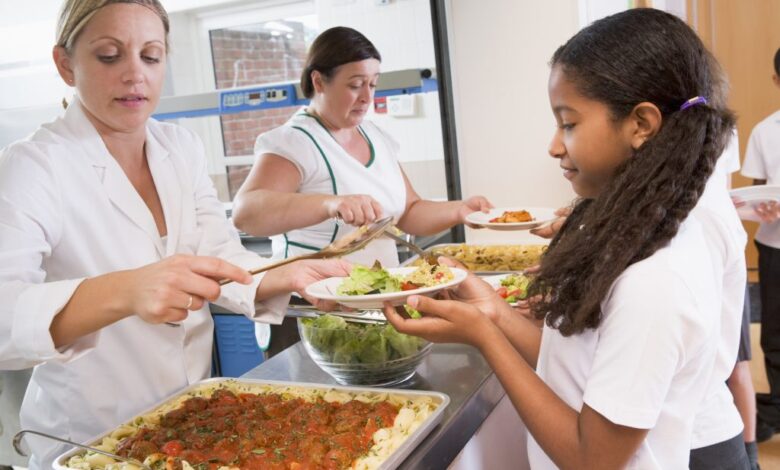Fresh nurse-backed call for universal free school meals

School nurses have once again urged the government to implement universal school meal provision for all primary and secondary school children in England, as part of fresh calls from leading public health organisations to tackle food poverty.
The Faculty of Public Health today published a report, in coalition with other health organisations including the School and Public Health Nurses Association (SAPHNA), which has called for current meal interventions in schools to be extended, to improve the health and productivity of pupils.
“The concerns about children’s nutrition are a public health concern”
Sallyann Sutton
The Health of the Next Generation – Good Food for Children was launched at parliament today and has been backed by cross-party MPs and peers.
The report highlighted that an estimated 4.2 million people (6%) across the UK lived in food-insecure households, meaning they do not have access to affordable, nutritious and healthy food.
In addition, it warned that children from lower socioeconomic backgrounds were more likely to face barriers in accessing nutritious food and that obesity rates were growing faster among children who live in deprived areas.
The coalition of the UK’s leading public health bodies argued that good food was “essential” for children and young people to develop and achieve their potential at school.
The report said: “Evidence related to a variety of health and wellbeing outcomes supports the call for increased provision of food to new mothers and their young children, as well as to children in school through providing breakfast clubs and free school meals.”
The call follows a letter sent last year to prime minister Rishi Sunak by public health leaders, which demanded urgent action to improve nutrition for children.
SAPHNA, which signed the letter and contributed to the new report, has repeatedly called for universal school meal provision in England over the last year.
Sallyann Sutton, interim professional officer at SAPHNA, told Nursing Times that the organisation was proud to take part in the campaigning.
She said: “There is clear evidence that improving nutrition, by providing good quality school meals for all, has significant benefits for children’s health and learning outcomes.
“The concerns about children’s nutrition are a public health concern and school nurses and specialist public health nurses have a key role in this agenda, supporting children and advocating for them.”
The new report examined current interventions in the UK that aim to support children to eat well, and relieve the burden of food insecurity, and called on the government to expand access to these schemes so no child is left behind.
Free School Meal Programme (England)
Currently in England, children between reception and year two receive universal free school meals.
Free school meals are also granted to older children whose families receive qualifying benefits, including income support and Universal Credit.
The report called for the UK Government to adopt universal school meals for all primary and secondary school children, to improve the next generation’s diet, health and educational attainment.
National School Breakfast Programme (England)
This programme provides school breakfast clubs for more than 2,700 primary, secondary and special schools.
The clubs offer breakfast to all pupils in an eligible school before lessons begin, at no cost to them or their parents.
The Department for Education currently funds the programme, offering a 75% subsidy for the food and delivery costs until July 2024.
However, the report called for long-term funding for the programme, which “should be decided well before the current programme’s end date” of July, to remove anxiety for families.
Healthy Start vouchers or card (England, Wales and Northern Ireland)
The Healthy Start scheme offers money towards healthy food and access to free vitamins during pregnancy and early childhood for families who receive income-based benefits.
The report highlighted that, in recent years, there had been fewer people taking up the scheme, blaming this trend on lack of “awareness of the scheme, the application process, language barriers and potential stigma”.
It asked the government to extend the eligibility, increase and standardise the value of the vouchers, and increase uptake by raising public awareness of the programme.
Professor Kevin Fenton, president of the Faculty of Public Health, said: “As a broad coalition of public health and medical professionals we are deeply concerned about the long-term health impacts facing our nation’s children as vulnerable families across the UK struggle to access nutritious food.
“By providing universal access to free school meals and expanding access to other existing programmes, our leaders in parliament have the opportunity to support a generation of children to lead healthy, happy and productive lives.”
Professor Fenton warned that poor physical and mental health caused by childhood food insecurity created “a poor foundation for future health”, meaning that children are more likely to experience health issues in adulthood.
“We face a critical turning point for the health of our next generation – we must take action now,” he added.
A Department for Education spokesperson said: “We want to give every child the best start in life and ensure that free school meals are available to those in need, whilst remaining affordable and deliverable for schools.
“We understand the pressures many households are facing, which is why we have more than doubled the number of children eligible for free school meals, with 2.1 million more children receiving them compared to 2010.
“We have also put further protections in place to ensure children who need them can continue to access free school meals, even if household circumstances change.”






